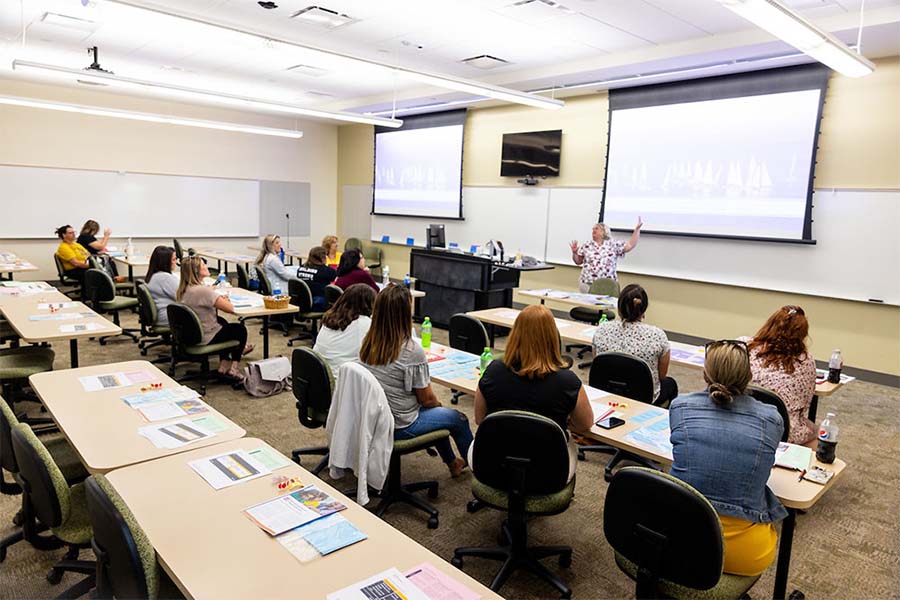As a new school year loomed large on the horizon last month, dozens of area teachers
converged on Radford University’s Kyle Hall for a daylong mentor retreat.
The Aug. 7 event, hosted by the College of Education and Development’s (CEHD) Office
of Field Experience, is designed to strengthen Radford’s partnerships with local public
educators – alliances built around providing teacher candidates with high-quality
preparation and developing strategies for strong mentorships of interns and student
teachers.
A large percentage of the new crop of incoming candidates are first-generation college
students who likely were high school upperclassmen or college underclassmen when the
COVID-19 pandemic hit, according to Associate Dean Debora Bays Wilbon, who directs
the Office of Field Experience.
“They persisted just like you persisted,” Bays Wilbon told the crowd of mentors in
her opening address. “Keep that in mind as you work with them. They've had that experience.
But they're passionate about becoming teachers, many of them because someone who was
a teacher impacted them in a positive way. So, we're very proud of them for making
that choice.”
She also praised the roughly 60 local teachers and administrators who were present
from divisions that included Carroll, Montgomery and Pulaski counties and the cities
of Radford and Roanoke.
“We take great pride and joy in preparing our teacher candidates here at Radford University,”
Bays Wilbon said. “It's a passion for us. But we cannot do it without your help. You're
our clinical practice partnerships, and you take an active role in mentoring interns
and early field experience and student teachers during their student teaching semesters.
“Without you, we couldn't prepare your future colleagues."
In his keynote speech, Brian Kitts, an assistant professor in the educational leadership
master’s program, eschewed the lectern and microphone to walk among the tables while
delivering remarks full of levity, admiration, a coach’s encouragement and real talk
with regard to the challenges the mentors face as teachers teaching teachers.
“There is no job in America more important that the job of the public schoolteacher,”
Kitts declared. “It is the last great institution in this country. Failure is not
an option. We can’t fail because if we fail, everybody fails.
“All the hard things in this world come to public schoolteachers,” he continued. “And
time and time again, people get those shovels out, and they shovel stuff in our way,
and what do we do? What do you do? You handle it.
“You care about the mission and people so much that you're willing to endure such
hardship, not for recognition, but for the sake of an outcome that simply benefits
others,” Kitts told the teachers. “You dedicate your life, your time, your effort
and your energy into raising other people's children to make our world a better place.”
Radford’s partnerships with local educational agencies are components of the university’s
national accreditation by the Council for the Accreditation of Educator Preparation
(CAEP), and a big part of that is the mentors’ use of commons assessments to evaluate
and give feedback to the teacher candidates and interns. While the focus is on continual
improvement, the evaluations also provide CAEP with valuable data.
To that end, CEHD’s Director of Assessment Matt Grimes presented an hourlong talk,
“Assessment: A Blueprint for Helping Candidates Learn and Grow,” which focused on
tools and practices used in evaluating and helping new fledgling educators.
Among numerous other pieces of advice he offered, Grimes cautioned mentors to be fair
but also deeply discerning in evaluating their charges.
“We’re trying to help these candidates learn what we all know, what we all practice,
what we all can do,” he said. “We want them to learn it, and if they’re [rated] ‘perfect,’
what feedback are you going to give them?
“We want really good data for a reason,” Grimes told the group. “Because then we can
help.
“The whole point of all this assessment is to be able to give constructive feedback.”
The retreat also featured several hours of mentors’ toolbox and resource choice sessions
led by Radford University faculty Melissa Lisanti, Ph.D., Carol Bland, Ph.D., and
Kristy McCowan; also Southwestern Virginia Public Education Consortium members Nancy
Bradley and Donna Foglesong; and Roanoke Public Schools Director of Employee Relations
John-Michael Deeds.
Those additional sessions covered online mentor training modules; mentor-teacher programs
for newer educators; methods of co-planning and optimal co-teaching with student teachers;
balancing the needs of teachers and candidates with the program; and high-level teaching
practices that succeed across a wide variety of environments.
